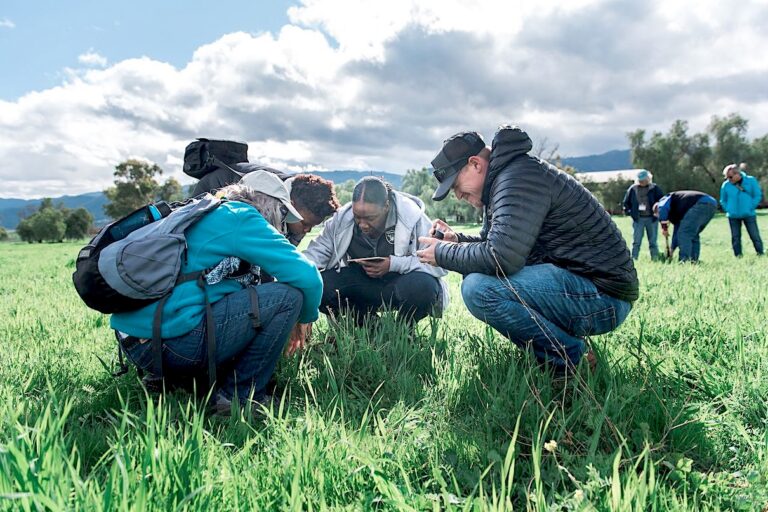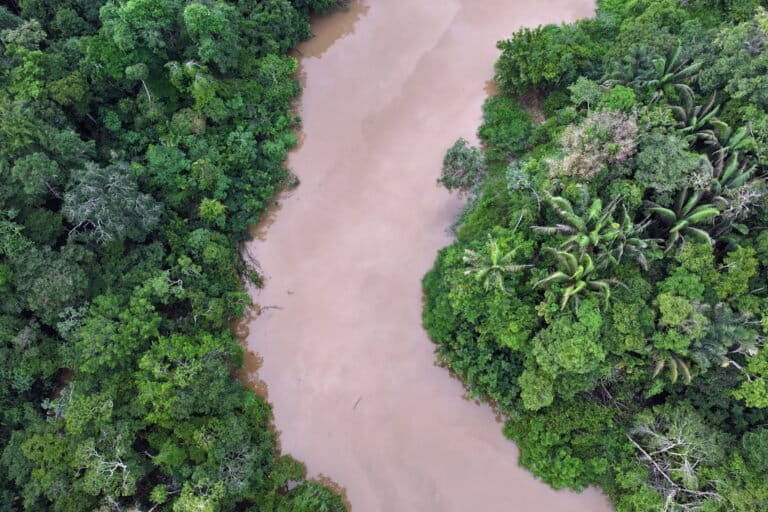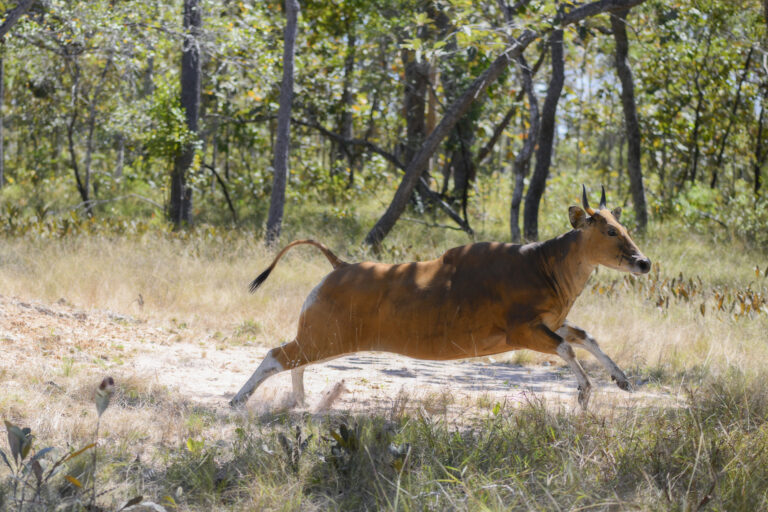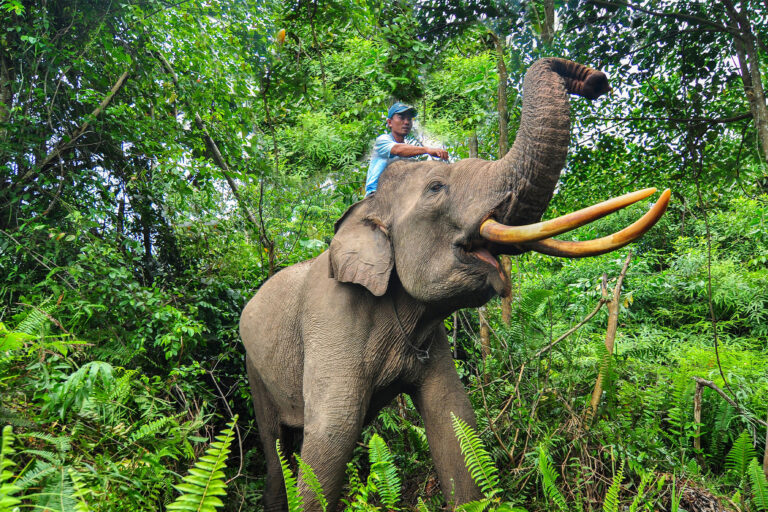- The world’s largest meatpacker had a long journey to the U.S. stock market, one full of reports of greenwashing and corruption.
- After debuting on the NYSE, the company plans to use its new access to Wall Street capital to expand operations in the United States, Brazil and Australia.
- Recently, it’s broadening its global footprint, with new plants in Nigeria, Vietnam and Saudi Arabia.
- Critics warn of environmental risks with JBS’ expansion and say the new listing could lead to more scrutiny from the U.S. Congress and courts.
On June 25, JBS (NYSE: JBS) founder José Batista Sobrinho, also known as Zé Mineiro, rang the opening bell at the New York Stock Exchange (NYSE) to applause. The ceremony culminated a yearslong effort by the Brazilian meatpacking giant to achieve a dual listing on both the Brazilian and U.S. stock exchanges. The long journey that began back in 2009 was marked by environmental violations, corruption scandals and greenwashing allegations.
Finally reaching American investors, analysts say, marks a new era for the company under the direction of Sobrinho’s sons, the meatpacking brothers Joesley and Wesley Batista, who serve as the controlling shareholders, board members and executives. The listing will pave the way for considerable growth and expansion for the corporation, already the world’s largest meat producer by revenue. But the public offering will also generate greater scrutiny of its global operations.
On June 13, JBS made its Wall Street debut with an opening share price of $13.65. Despite initial reports that the company had underperformed, the stock has remained at midrange levels, within market expectations. “Stock investors see JBS as a mature company where the earnings fluctuate a lot,” said Jay Ritter, an expert on initial public offerings (IPOs) and professor emeritus at the University of Florida. “Right now, the company has high earnings, but investors know this industry is cyclical.”
Only 10 days later, debt investors cast a vote of confidence in the company’s long-term growth. As JBS held its first bond sale, investors purchased $3.5 billion in loans, with a demand five times higher than the offering. The showing indicates the market is betting on the company’s future and its ability to repay these loans within 10-40 years.
“Some investors might stay away from JBS because of past corruption and environmental controversies. But a large number want to include the company as part of their financial portfolio,” Ritter told Mongabay. “The truth is that boycotts don’t seem to have a big impact on the market because not enough investors care about them.”

A long road to NYSE
The success on Wall Street comes after a long journey. The company’s first attempt at getting listed on the NYSE dates back to 2009, when it submitted a registration with the U.S. Securities and Exchange Commission (SEC), the federal stock market regulator, after setting up a holding company in Ireland. The company withdrew the petition later that year, claiming the need for corporate restructuring.
A second attempt in 2017 failed because the meatpacker was engulfed in a corruption scandal in Brazil that nearly toppled former President Michel Temer (2016-18). The Batistas, along with other executives from JBS and its parent group, J&F Investimentos, admitted to making multimillion-dollar payments to hundreds of public officials and political candidates in exchange for favors. This scheme was an offshoot of Operation Car Wash, a probe into political graft that significantly impacted Brazil’s establishment but fell into disgrace as some accusations collapsed and procedures were called illegal by the Supreme Court.
Allegations included a secret recording of then-President Temer apparently discussing bribes with Joesley, which led to calls for the president’s resignation. Joesley later publicly stated, “We made mistakes and apologize.”
As a consequence of their confessed role, the brothers were imprisoned for six months in 2017 on insider trading charges. They were acquitted in 2023 and a plea bargain ensured that no additional criminal charges were brought against them. J&F agreed to pay a record penalty of 10.3 billion reais (approximately $1.8 billion at today’s exchange rate) to Brazilian authorities and $256 million to the U.S. Department of Justice under a similar cooperation agreement. Despite this, a Brazilian Supreme Court judge in December 2023 suspended J&F’s mega-fine in the country, arguing that prosecutors were biased during the negotiation of the plea deal.

At its third and final attempt at NYSE listing, it took the company two years to get approval from the SEC due to concerns over voting structure, compliance with U.S. regulations and environmental risks. In August 2023, nonprofit organizations including Mighty Earth and the Rainforest Action Network urged the agency to investigate the company’s history of corruption and deforestation in the Amazon and Cerrado savanna, alleging that JBS made misleading claims about its environmental impact and failed to disclose associated risks.
Just before JBS finally received SEC approval, Mighty Earth also warned the board of the NYSE about the risks of knowingly violating U.S. anti-money laundering laws if it allowed the meatpacker’s IPO. Listing would “facilitate the acquisition, distribution, conversion, use or control of the proceeds of crime to shareholders, namely profits derived from cattle grazed on illegally deforested land,” according to the legal notice. Besides cataloguing “extensive evidence of JBS benefitting from persistent criminal conduct within its beef supply chains in Brazil, namely illegal deforestation,” the notice also says JBS’ listing would be a violation of the Lacey Act. The U.S. law prohibits imports derived from wildlife or plant-related activities that violate a foreign law protecting natural resources, such as Brazilian environmental laws.
In November 2024, after Donald Trump was elected in the U.S., the company made a $5 million donation to his inaugural committee, the largest of any donor, according to the British news service Reuters. In 2025, the Brazilian company doubled its spending on lobbying in the first three months, an analysis by U.S. newspaper The New York Times showed.
JBS got its NYSE listing in April.
Senator Elizabeth Warren questioned whether the company’s contributions to the Trump-Vance Inaugural Committee had influenced the SEC’s decision to approve its listing, after years of waiting.

A $6 billion expansion plan
Access to Wall Street capital will help the company strengthen its financial standing and pave the way for more growth.
During an investor call in May, CEO Gilberto Tomazoni announced the new funds would be immediately applied to improving the meatpacker’s financial health. This includes paying down upcoming debt and extending the payment timelines for existing debt. “It’s [a constant] exercise of extending the maturities to have this comfortable amortization schedule,” he said, in English.
Moving forward, JBS wants to invest in expanding operations. In a presentation to investors right after the opening bell, JBS revealed a five-year plan to inject $6 billion into new projects, including factories, equipment and facility upgrades. The idea is driving growth in the already established markets of the United States, Brazil and Australia.
Rob Dongoski, global lead for Food and Agribusiness at the strategy and management consulting firm Kearney, predicts the company will primarily focus on the U.S. “That is their biggest opportunity for growth and profitability right now,” he told Mongabay. “American consumers are turning towards protein and produce, while sugary, salty and beverage markets are declining.”
A clear path to expansion lies in the prepared foods market, ranging from frozen meals to snack packs. “That market is fuel for growth, and they should do well as long as their prepared foods are not ultraprocessed,” he said. JBS plans to increase production in this segment through its established poultry brand, Pilgrim’s Pride Corporation, as well as other U.S. brands.
There’s also an untapped market in the branded meat segment. “There’s still a lot of meat that sits in the grocery store freezer that doesn’t have a brand on it,” Dongoski told Mongabay. “Whether they apply private or grocery labels to this meat, we are starting to see some of the big protein brands show up.”
The meatpacking giant is also broadening its global footprint. In the past year, the company announced the development of six beef, poultry and pork plants in Nigeria, two in Vietnam and a chicken nuggets facility in Saudi Arabia. “But there are complexities in those markets that make them tougher,” he said. “These moves will add to their top line, but not necessarily create any kind of accretive growth.”

Heightened oversight
JBS states that it’s committed to delivering “zero illegal deforestation in all Brazilian biomes by the end of 2025 for direct and indirect cattle suppliers,” according to its website. The company says it uses a geospatial monitoring system at its headquarters to display supplier locations and blacklists properties with detected irregularities, currently around 14,000, according to the British newspaper Financial Times.
However, several reports from NGOs and news outlets have shown the Batistas are doing a poor job of keeping up with their promises. Recent investigations by news site Repórter Brasil have revealed cattle laundering by tracing deals between JBS and individuals accused of land-grabbing and illegally raising cattle in protected and Indigenous areas. These reports revealed a pattern of buying cattle from illicit origins, as shown by Mongabay in the Pantanal wetlands.
JBS told the Financial Times it will require suppliers to provide information on whom they buy from, starting “next year,” and is sharing responsibility with direct suppliers for the legal purchase of animals. The company argues that the most definitive solution to preventing deforestation is a mandatory nationwide cattle identification system that tracks animals throughout their lives via compulsory electronic ear tags, which is in early stages in Pará state and nationwide.
As part of the NYSE, JBS will be required to submit annual reports and business disclosures that cite risks and legal liabilities. However, because the company is a foreign private issuer, these requirements are less stringent than those for U.S. corporations. “We need better transparency on the real impacts of these companies,” said Ashley Thomson, a Global Witness senior policy adviser. “The financial system should have more regulations to make this type of information available for investors.”

Thomson views the U.S. Congress as a more likely avenue for changing those rules and holding the company accountable.
The meatpacking giant has already been on lawmakers’ radar. In 2022, the company was called to testify by the House Agriculture Committee on “unfair practices in cattle markets.” Senator Warren, in 2023, requested the suspension of the USDA’s contracts with JBS due to allegations of child labor.
Two years later, a bipartisan group of U.S. senators raised concerns about the NYSE listing, citing the meatpacker’s history of “corruption, human rights abuses, monopolization of the meatpacking market, as well as environmental risks.”
Meanwhile, New York Attorney General Letitia James is suing the company for greenwashing, based on claims that it would achieve net-zero emissions by 2040 and reduce emissions by 30% by 2030. In January, the New York Supreme Court issued a partial dismissal of the lawsuit but allowed the Attorney General’s Office until Aug. 31st to amend the complaint.
Additional oversight is likely to come from the civil courts.
As it prepared for NYSE listing, the meatpacker set up a parent company in the Netherlands. The practice is common among corporations seeking beneficial voting rights regulations and favorable tax treaties. However, the country is also at the forefront of climate litigation, with a wave of lawsuits against corporations making their way through the courts.

In one of the most notable cases, a coalition led by the nonprofit Milieudefensie (Friends of the Earth) sued Shell in 2019 over the environmental and human rights impacts linked to greenhouse gas emissions. While the Court of Appeal in The Hague declined to set specific emissions reduction targets, it established a legal precedent by stating that the company has obligations to reduce emissions to curb climate change.
“We are baffled as to why JBS would stay in the Netherlands given the way in which the courts are behaving,” said Richard Brown, legal counsel at Greenpeace International. “I think it is highly likely that civil society will look to the Dutch courts to limit JBS’s growth plans. And that is a real risk for investors, because you’ve invested in the back of a growing business.”
Greenpeace has already sent a letter to the lawyers representing JBS in the Netherlands, questioning their ethical conduct. They are now considering a lawsuit regarding emissions associated with new ventures. “When a company is investing in brand new plants, opening new markets and encouraging agriculture on a large scale, that investment comes with embedded emissions,” he said. “These emissions are not consistent with your climate obligations as a Dutch company.”
Meanwhile, new investigations into the company’s operations are underway. “The accusations will continue,” said Alex Wijeratna, senior director of legal and investigations at Mighty Earth. “There are a lot of large environmental groups working on upcoming reports on deforestation, forced labor and even methane emissions. JBS’s problems are not over because of this listing,” he said.
JBS did not respond to requests for comments from Mongabay about its plans, heightened public scrutiny after its NYSE listing and allegations from NGOs and U.S. lawmakers.
JBS broke its own rules while buying cattle from deforested areas in Pantanal
FEEDBACK: Use this form to send a message to the author of this post. If you want to post a public comment, you can do that at the bottom of the page.














